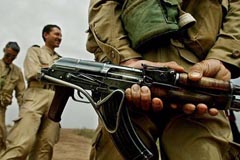There is a great difference between laying down arms or being forcibly disarmed
For sure there is a great difference between surrendering, laying down arms or being forcibly disarmed. In the question of Mojahedin Khalq Organization MKO/MEK, it claims to have  surrendered its arms to American forces after the coalition forces invaded Iraq in 2003. But when the US officials, and in most cases pro-MKO Americans, refer to the issue of arms and Ashraf, they state that the group has been disarmed. Even those American military commanders who had responsibility for Ashraf have all attested, when coming to testify in behalf of MKO, that MKO was disarmed. For instance, as reported by MKO’s own reporting channel, “Gen. Raymond Odierno (then 4th ID commander) in a video teleconference from Baghdad on June 18, 2003, stated that MEK ‘have been completely disarmed. We have taken all small arms and all heavy equipment’.”
surrendered its arms to American forces after the coalition forces invaded Iraq in 2003. But when the US officials, and in most cases pro-MKO Americans, refer to the issue of arms and Ashraf, they state that the group has been disarmed. Even those American military commanders who had responsibility for Ashraf have all attested, when coming to testify in behalf of MKO, that MKO was disarmed. For instance, as reported by MKO’s own reporting channel, “Gen. Raymond Odierno (then 4th ID commander) in a video teleconference from Baghdad on June 18, 2003, stated that MEK ‘have been completely disarmed. We have taken all small arms and all heavy equipment’.”
During a May 8 hearing before the US Court of Appeal for the District of Columbia, the attorney for the U.S. Department of State, Robert Loeb, remarked that the U.S. military had “never been able to inspect it [Camp Ashraf].” He also stated that the residents of Camp Ashraf did not permit the U.S. military to inspect the camp. “The MEK did not permit it at that time, and the military was unable at the time” to inspect Camp Ashraf, and “the MEK did not permit an inspection. . . . They did not permit a sort of door-to-door inspection of looking for [caches] of weapons or to actually disarm them door-to-door.” Then, the conclusion one may grab at is that neither MKO have surrendered, against its claim, all its arms nor the US army is able to verify that the MKO has been fully disarmed.
Fairly reluctant to surrender its arms MKO submitted to be disarmed only after the calculations that it could in no way resist any probable invasion against its military camps by the coalition forces. Although it did engage in a series of unserious clashes with American forces through which left MKO with a number of casualties, at the end it was a cease-fire agreement that forced MKO to surrender and be disarmed.
As well stipulated in RAND’s research, “both the official U.S. Army Special Forces history and the official U.S. Army history of OIF indicate that the MeK engaged coalition forces in battle, presenting a “formidable threat” and demonstrating “excellent fighting qualities.” Nevertheless, on April 13, 2003, in the face of collapsing Iraqi forces, the MeK requested peace. U.S. Central Command (USCENTCOM) ordered the special operations unit that had received the request to demand that the MeK capitulate and be disarmed.”
Even if there are some to become reconciled to MKO’s claim that it surrendered its arms, they have to be convinced of the fact that it happened after the group’s leadership negotiated a cease-fire with Coalition Forces and surrendered their heavy-arms following which all members of the group stationed in a variety of camps were encamped at Ashraf to be under a strict control. The ultimate decisiveness of the US State Department to have a thorough inspection of Camp Ashraf after its evacuation is because it is the aware side of the party that reached an agreement with the group. For sure those who conducted the agreement with MKO have full access to the genuine classified and unclassified information about the willing surrender or forced disarmament of the group. At least the released and unclassified details by RAND’s research have enough to uncover some truth:
“Coalition officers endured a two-day negotiation with the MeK in early May. Again, the MeK presented itself sympathetically and negotiated tenaciously, succeeding in dissuading the coalition from forcing its surrender. Instead, the new agreement of May 10—which supplanted the April 15 agreement—allowed the MeK to continue to claim neutrality and to accept a lasting cease-fire. The principal differences between this agreement and the April 15 cease-fire agreement were the disarmament of MeK forces and the consolidation of all MeK personnel in Iraq at a single facility, Camp Ashraf in Diyala Province. The agreement also required each member of the MeK to sign a document renouncing terrorism and the use of violence.”

